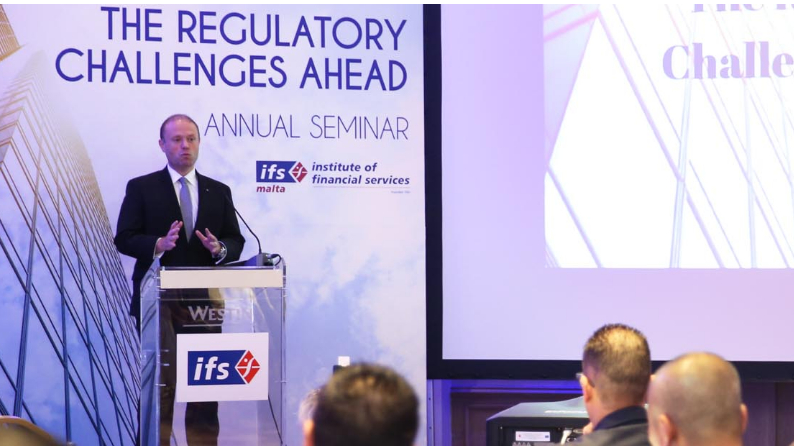Prime Minister Joseph Muscat warned operators in the Financial Services sector on Thursday not to “adopt a siege mentality” and to engage with international critics. Addressing an annual seminar organised by the Institute of Financial Services, Muscat said he needs the help of the industry to defend what he insisted is a solid and transparent system.
This follows increasing international scrutiny of an economic model which has been described as a “pirate base” for tax avoidance in the European Union by a journalists’ network called the European Investigative Collaborations (EIC) .
What we do and say comes under international scrutiny and burying our heads in the sand does not help our cause. But what is good for the goose is good for the gander.
It is Muscat himself who should start “engaging” with those who are not just criticising the financial sector but also the institutional paralysis following the Panama outing.
If he is genuine in his call for engagement with international critics, then he should first ask his Chief of Staff Keith Schembri to explain his offshore investments to a delegation of MEPs who will be visiting Malta next week to investigate the rule of law in the country.
Muscat must also lead by example.
The Prime Minister knows that having a Minister and a Chief of Staff outed in the Panama Papers for owning offshore companies in a secretive tax haven has eroded his government’s moral authority to address problems in this sector. The PM also knows that revelations on the Malta Financial Services Authority Chairman Joe Bannister have further ruined Malta’s reputation.
Yet Muscat has stuck to his defence of Joe Bannister in Parliament, despite his being involved as a non-executive director in a company based in the British Virgin Islands (BVI) set up in 2007 after Bannister was appointed in his role. Bannister was also the same person who issued a licence for Pilatus bank which was later subject to an FIAU investigation.
Muscat likes reminding us that Bannister enjoyed the trust of the previous PN administration, but this is clearly not the point. The point is that someone involved in offshore business should not be involved in regulating it. But how can Muscat fire Bannister before doing the same to Minister Konrad Mizzi and his Chief of Staff Keith Schembri?
Muscat is also wrong when defending our system lock, stock and barrel. His claim that it is “solid, transparent and fully compliant” is only partly true.
Companies registered in Malta are publicly recorded and information of how they are composed is publicly available. Malta is not like Panama or the Bahamas. It is not primarily chosen for its secrecy but for fiscal advantages, mainly its tax imputation system effectively allowing foreign investors to pay five per cent corporate tax on company profits.
This is a reality that contrasts with growing demand for global tax justice. Over and above, our system has other faults which expose it to even more international scrutiny.
It is very difficult in this day and age to defend a scheme where Maltese companies can purchase a yacht and lease it to a third party, allowing them to pay VAT at a substantially reduced rate. For a yacht that cost some €13 million, an oligarch from the Ukraine exposed in the Paradise Paper probably saved over €3 million in taxes.
Moreover, with regards to secrecy, Malta does have a big problem with nominee companies which disguise the ultimate owner of a company. This makes these letter box companies a magnet for crooks. Closing this loophole is of vital importance to restore Malta’s reputation.
It is also ridiculous that the Chairman of the regulatory body (MFSA) also acts as the Deputy Chairman of Finance Malta. The same person is tasked with both attracting companies to Malta and advising them about the tax rebates available to them, as well as carrying out the necessary due diligence checks on the same companies he himself attracted to the island.
If the Prime Minister is really interested in making this sector “future proof” he needs to address these issues. But first and foremost he must lead by example. Repeating the obvious has become tiring. Next week’s visit by a European Parliament delegation to investigate the rule of law in Malta opens a window of opportunity to Muscat to get his house in order.













